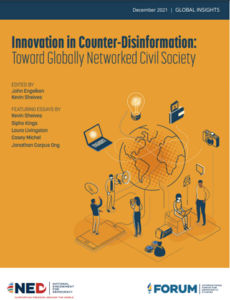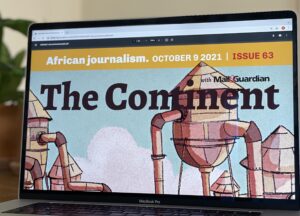 Digital capabilities are ideologically neutral and can serve authoritarian as well as democratic tendencies, so development donors must be wary of whom they partner with and how they deliver assistance for digital government, says a new Brookings analysis.
Digital capabilities are ideologically neutral and can serve authoritarian as well as democratic tendencies, so development donors must be wary of whom they partner with and how they deliver assistance for digital government, says a new Brookings analysis.
At the Summit for Democracy, USAID Administrator Samantha Power called for a Surveillance Principles Initiative, consistent with the Universal Declaration of Human Rights and the rule of law, that protects user data and fights discrimination, George Ingram and Meagan Dooley observe. Beyond that, donors, to ensure their support for digital development is deployed for benevolent and constructive purposes, should develop a set of principles designed to wall off the capabilities of digital government from misuse and abuse and protect open government and the rights and privacy of citizens.
 In her Nobel Peace Prize lecture on December 10, Filipino journalist Maria Ressa called for a global response to the challenge of disinformation driven by new technologies, the International Forum for Democratic Studies observes.
In her Nobel Peace Prize lecture on December 10, Filipino journalist Maria Ressa called for a global response to the challenge of disinformation driven by new technologies, the International Forum for Democratic Studies observes.
On the heels of the Summit for Democracy, where preserving the integrity of the information space was identified as a key challenge, the Forum released a new publication with five interdisciplinary essays that focus on a globally networked response to disinformation that goes beyond platform-centered solutions, combats it in the non-digital sphere, and addresses the information integrity challenges of illiberal regimes in sub-Saharan Africa and Southeast Asia.
While civic activists and civil society organizations still remain far behind the pace of the disinformation threat, they actors remain well positioned to rise to the challenge, notes the Forum’s Kevin Sheives. A “globally networked counter-disinformation response” would leverage the abilities of activists, journalists, and civil society by empowering counter-disinformation organizations with the research and response tools they need, he contends.

Credit: Niemann Reports
As consumer choices for information consumption and communication multiply into new encrypted messaging applications, such as WhatsApp, Signal, or WeChat, innovative news outlets are experimenting with how to connect better with audiences, writes Sipho Kings, the editor of Africa’s WhatsApp-based paper, The Continent. Approaches include delivering information from sources that are more trustworthy, more local, and more curated than mass media or the major social media platforms, he writes in “Safeguarding New Social Media Platforms: A WhatsApp Newspaper that Meets Readers Where They Are.”
Off-platform sources of misinformation, including those in tightly knit local community circles, can be just as dangerous as a lie-riddled Facebook group, argues Laura Livingston, who researches the effects of communication on violence at Over Zero. In this context, exposing the underlying psychological aspects of why misinformation flourishes, as such, could be as critical as exposing the latest bot network, she writes in “Understanding the Context Around Content: Looking behind Misinformation Narratives.”
 Effecting change in the public consciousness is likely to emerge from journalism that helps audiences understand the impact of the threat upon everyday society or the network’s operative infrastructure, adds Casey Michel, author of American Kleptocracy. Investigative journalists can track down the trolls behind electoral influence operations, follow disinformation-for-hire money from Russia to LLCs in advanced democracies, and expose the violation of disclosure requirements of coopted social media influencers, he contends in “Investigative Journalism: A Lynchpin for Understanding Disinformation.”
Effecting change in the public consciousness is likely to emerge from journalism that helps audiences understand the impact of the threat upon everyday society or the network’s operative infrastructure, adds Casey Michel, author of American Kleptocracy. Investigative journalists can track down the trolls behind electoral influence operations, follow disinformation-for-hire money from Russia to LLCs in advanced democracies, and expose the violation of disclosure requirements of coopted social media influencers, he contends in “Investigative Journalism: A Lynchpin for Understanding Disinformation.”
The challenges of local, counter-disinformation organizations operating under repressive regimes are the focus for the University of Massachusetts-Amherst’s Jonathan Corpus Ong. He examines the ambivalent, and at times discordant, relationships between foreign supporters and local organizations that both work toward countering disinformation. Funders, researchers, and other civil society organizations from outside closed settings must adapt their approach to collaboration and support, in full recognition of the repression organizations face, he writes in “Building Comprehensive Approaches to Combating Disinformation in Illiberal Settings: Insights from the Philippines.”
 The lack of data literacy among democracy activists and practitioners therefore represents a concerning skills gap that hinders local actors’ ability to advance democracy and governance efforts and activism, the International Republican Institute observes.
The lack of data literacy among democracy activists and practitioners therefore represents a concerning skills gap that hinders local actors’ ability to advance democracy and governance efforts and activism, the International Republican Institute observes.
To address this skills gap, IRI has developed a Data Literacy Curriculum tailored to the needs of democracy activists. With funding from the National Endowment for Democracy (NED), and in partnership with the Open Knowledge Foundation, the curriculum was piloted, tested, and revised over the course of the “Data for Democracy” program, which provided training on data skills to a cohort of democracy activists from around the world.
“Charting a New ‘Digital Atlantic,’” provides the strategic rationale for a Digital Atlantic and identifies why a transatlantic digital future is in the best interest of both the United States and the European Union, note CSIS experts James A. Lewis, Heather A. Conley, Colin Wall & Eugenia Lostri.
A follow-up report, “Choppy Seas for a Digital Atlantic,” noted that while it is important to recognize the transatlantic frictions in these areas, the challenges posed by these frictions are outweighed by the opportunities to construct a Digital Atlantic driven by shared democratic values and the pursuit of mutual economic growth and security. A final report, “Recommendations for a Digital Atlantic,” stresses that It is essential to develop rules governing tech companies on data privacy, harmful content, and anti-competitive behavior that are consistent with democratic norms, insisting that mutual democratic values outweigh any differences.
 Countering digital authoritarianism
Countering digital authoritarianism
As the illiberal use of technologies threatens human rights worldwide, American and Canadian practitioners, researchers, and members of the private sector and civil society will discuss strategies used by authoritarian states, the Montreal Institute for Genocide and Human Rights Studies (MIGS) writes.
Speakers
- Introduction: U.S. Consul General Ana Escrogima, U.S. Consulate General Montreal
- David Kaye, clinical professor of law at the University of California, Irvine, and former UN special rapporteur on the promotion and protection of the right to freedom of opinion and expression
- Chris Walker, vice-president for Studies and Analysis, National Endowment for Democracy
- Suzanne Nossel, chief executive officer of PEN America
- Ron Deibert, director of the Citizen Lab at the Munk School, University of Toronto
- Inga Kristina Trauthig, research manager and senior research fellow, Center for Media Engagement (University of Texas).
Tuesday, January 18, 2022. 11 a.m. – 12:15 p.m. RSVP








